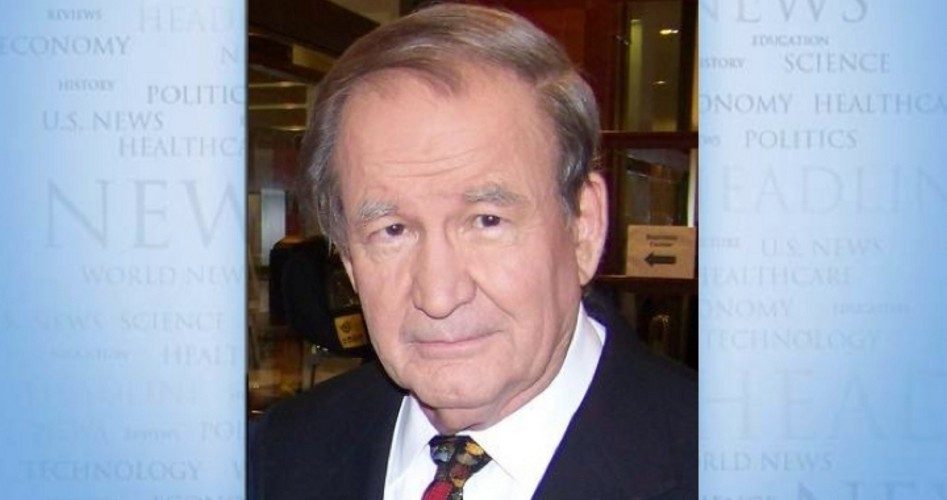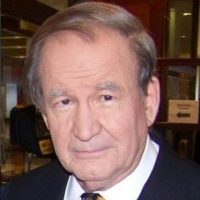
Before the largest audience of his political career, save perhaps his inaugural, Donald Trump delivered the speech of his life.
And though Tuesday’s address may be called moderate, even inclusive, Trump’s total mastery of his party was on full display.
Congressional Republicans who once professed “free-trade” as dogmatic truth rose again and again to cheer economic nationalism.
“We’ve lost more than one-fourth of our manufacturing jobs since NAFTA was approved,” thundered Trump, “and we’ve lost 60,000 factories since China joined the World Trade Organization in 2001.”
Yet a Republican party that embraced NAFTA and voted MFN for China every time it came up gave Trump standing ovations.
“(W)e have inherited a series of tragic foreign policy disasters,” said Trump, “America has spent approximately six trillion dollars in the Middle East — all the while our infrastructure at home is crumbling.”
And from Congressional Republicans who backed every Bush-Obama war — Afghanistan, Iraq, Libya, Syria, Yemen — not a peep of protest, as their foreign policy legacy was being consigned to the dumpster.
Watching Republicans rise again and again to hail Trump called to mind the Frankish King Clovis who, believing his wife’s Christian God had interceded to give him victory over the Alemanni, saw his army converted by the battalions and baptized by the platoons.
One had thought the free-trade beliefs of Republicans were more deeply rooted than this.
“We have withdrawn the United States from the job-killing Trans-Pacific Partnership,” Trump exulted, having just tossed into the trash that mammoth trade deal beloved of Bush Republicans.
GOP champions of the TPP, if there are any left, sat mute.
Trump cited the first Republican president, Lincoln, as having got it right when he warned, “abandonment of the protective policy by the American Government (will) produce want and ruin among our people.”
Celebrating protectionism, hailing “America First!” in a virtual State of the Union address — it doesn’t get any better than this.
To open-borders Republicans who backed amnesty for 11 million illegal immigrants, Trump had this message, “We will soon begin the construction of a great wall along our southern border.”
And the cheering did not stop.
The president invoked Eisenhower’s Interstate Highway System, the greatest public works project of the 20th century, as a model.
Yet Ike was opposed by the Taft wing of his party and Ike’s republicanism gave birth to the modern conservative movement.
Yet, in leading Republicans away from globalism to economic nationalism, Trump is not writing a new gospel. He is leading a lost party away from a modernist heresy — back to the Old-Time Religion.
In restating his commitment to the issues that separated him from the other Republicans and won him Wisconsin, Michigan, Ohio and Pennsylvania, however, Trump reaffirmed aspects of conservatism dear to his audience.
He committed himself to regulatory reform, freeing up the private sector, rolling back the administrative state. The Keystone and Dakota Access pipelines are on the way to completion. And Trump is all behind school choice.
While the speech was unifying and aspirational, the president set goals and laid down markers by which his presidency will be judged.
And none will be easy of attainment.
“Dying industries will come roaring back to life…. Crumbling infrastructure will be replaced with new roads, bridges, tunnels, airports and railways…. Our terrible drug epidemic will slow down and, ultimately, stop…. Our neglected inner cities will see a rebirth of hope, safety and opportunity.”
As some of these domestic crises are rooted in the character, or lack of it, of people, they have proven, since Great Society days, to be beyond the capacity of government to solve.
Ronald Reagan was not wrong when he said, “Government is not the solution to our problems; government is the problem.”
And while the president’s speech astonished critics as much as it reassured friends, it leaves large questions unanswered.
How does one leave Social Security and Medicare untouched, grow defense by more than $50 billion, slash taxes, launch a $1 trillion infrastructure program — and not explode the deficit and national debt?
Now that we are ensnared in wars all over the Middle East, how do we extricate ourselves and come home without our enemies filling the vacuum?
How does the GOP repeal and replace Obamacare without cutting the benefits upon which millions of Americans have come to rely?
How do you eliminate an $800 billion merchandise trade deficit without tariffs that raise the price of cheap imports from abroad — on which Trump’s working-class voters have come to depend?
The Republican establishment today bends the knee to Caesar.
But how long before K Street lobbyists for transnational cartels persuade the GOP elite, with campaign contributions, to slow-walk the president’s America First agenda?
Tuesday’s speech established Trump as the man in charge.
But how loyal to him and his program will be the “deep state,” which dominates this city that gave Trump only 4 percent of its votes and, paranoically, believes him to be an agent of Vladimir Putin?
The Trump-Beltway wars have only just begun.
Photo of Patrick J. Buchanan: By Bbsrock – Own work, CC BY-SA 3.0, https://commons.wikimedia.org/w/index.php?curid=3369020
Patrick J. Buchanan is the author of the new book The Greatest Comeback: How Richard Nixon Rose From Defeat to Create the New Majority. To find out more about Patrick Buchanan and read features by other Creators writers and cartoonists, visit the Creators website at www.creators.com.
COPYRIGHT 2017 CREATORS.COM



